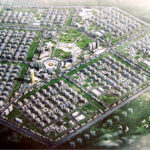The Future of Architecture and Engineering: Top 10 Trends to Watch in 2024
Outline
- Introduction
- Sustainable and Green Building Practices
- Technological Advancements
- Prefabrication and Modular Construction
- Urbanization and Smart Cities
- Resilient and Adaptive Designs
- Key Sectors and Services
- Why Choose CCG?
- Testimonials and Client Feedback
- Frequently Asked Questions
- Conclusion
- Get in Touch with CCG
Introduction
As we step into 2024, the fields of architecture and engineering are poised for significant transformation. Emerging trends are reshaping how professionals approach design, construction, and project management. This article explores the key trends expected to dominate the industry this year.
Sustainable and Green Building Practices
- Eco-Friendly Materials
Sustainability is no longer a niche consideration but a fundamental aspect of modern architecture and engineering. The use of eco-friendly materials, such as recycled steel, bamboo, and green concrete, is gaining traction. These materials reduce environmental impact and promote a healthier planet.
- Energy-Efficient Designs
Energy efficiency is at the forefront of building design. Architects are incorporating features like passive solar design, high-performance insulation, and energy-efficient windows to minimize energy consumption. These designs not only reduce operational costs but also align with global efforts to combat climate change.
- LEED Certification
LEED (Leadership in Energy and Environmental Design) certification continues to be a benchmark for sustainable buildings. Achieving LEED certification demonstrates a commitment to green building practices and can enhance a project's marketability and value.
Technological Advancements
- Building Information Modeling (BIM)
BIM technology is revolutionizing the way architects and engineers plan and execute projects. By creating detailed digital representations of buildings, BIM facilitates better collaboration, reduces errors, and improves project efficiency.
- Virtual and Augmented Reality in Design
Virtual and augmented reality (VR/AR) are becoming integral tools in the design process. These technologies allow clients and stakeholders to visualize spaces in immersive 3D environments, making it easier to convey design concepts and make informed decisions.
- Smart Buildings and IoT Integration
The integration of Internet of Things (IoT) technology in building design is creating smart buildings that enhance occupant comfort and operational efficiency. Smart sensors, automated systems, and data analytics are used to monitor and optimize building performance in real-time.
Prefabrication and Modular Construction
- Benefits of Prefabrication
Prefabrication involves assembling building components in a controlled factory environment before transporting them to the construction site. This method offers numerous benefits, including reduced construction time, lower costs, and improved quality control.
- Examples of Modular Projects
Modular construction, a subset of prefabrication, involves creating entire building modules off-site. These modules are then transported and assembled on-site. Notable examples include modular hospitals, schools, and residential buildings, which demonstrate the versatility and efficiency of this approach.
- Future Prospects
The future of prefabrication and modular construction looks promising. Advances in materials, automation, and design are likely to further enhance the capabilities and applications of these methods, making them integral to the future of construction.
Urbanization and Smart Cities
- The Rise of Smart Cities
Urbanization is accelerating the development of smart cities worldwide. These cities leverage technology to improve infrastructure, reduce energy consumption, and enhance the quality of life for residents. Smart cities incorporate IoT devices, data analytics, and sustainable practices to create more efficient urban environments.
- Role of Engineers and Architects
Engineers and architects play a critical role in shaping smart cities. By integrating innovative designs and advanced technologies, they create urban spaces that are not only functional but also sustainable and adaptable to future needs. Their expertise is essential in addressing the challenges of urbanization, such as traffic congestion, pollution, and resource management.
- Case Studies
Several cities around the world serve as excellent examples of smart city initiatives. For instance, Singapore's Smart Nation initiative focuses on harnessing technology to improve urban living. Similarly, Barcelona has implemented numerous smart city projects, including smart lighting, waste management, and public transportation systems, to enhance the city's efficiency and sustainability.
Resilient and Adaptive Designs
- Designing for Climate Change
Climate change is a pressing concern that demands resilient and adaptive design strategies. Architects and engineers are increasingly focusing on creating structures that can withstand extreme weather events, such as hurricanes, floods, and heatwaves. This involves using resilient materials, implementing flood mitigation measures, and designing buildings that can adapt to changing environmental conditions.
- Adaptive Reuse of Buildings
Adaptive reuse is the process of repurposing existing buildings for new uses. This sustainable approach preserves historical and cultural heritage while reducing the environmental impact of demolition and new construction. Examples include converting old factories into residential lofts or transforming historic warehouses into commercial spaces. Adaptive reuse not only conserves resources but also revitalizes communities and adds character to urban environments.
- Disaster-Resilient Structures
Designing disaster-resilient structures is crucial in regions prone to natural disasters. Engineers and architects are incorporating features such as reinforced foundations, flexible building materials, and advanced engineering techniques to enhance the durability and safety of buildings. These structures are designed to minimize damage and ensure the safety of occupants during and after disasters.
Key Sectors and Services
- Electrical & Mechanical Services
CCG offers comprehensive electrical and mechanical engineering services, including design, installation, and maintenance. These services ensure that building systems are efficient, reliable, and compliant with industry standards. By integrating the latest technologies, CCG delivers solutions that meet the evolving needs of modern infrastructure projects.
- Roads & Transportation Projects
Transportation infrastructure is a vital component of urban development. CCG specializes in the planning, design, and management of roads and transportation projects. This includes highways, bridges, and public transit systems. Through innovative engineering practices and sustainable solutions, CCG enhances connectivity and mobility in urban areas.
- Water & Wastewater Management
Effective water and wastewater management is essential for sustainable development. CCG provides expert services in this sector, from the design of treatment plants to the implementation of distribution networks. By leveraging advanced technologies and best practices, CCG ensures the efficient use and management of water resources.
Why Choose CCG?
- Commitment to Excellence
CCG is dedicated to delivering exceptional quality in every project. Our commitment to excellence is reflected in our meticulous attention to detail, rigorous quality control processes, and unwavering dedication to client satisfaction. By setting high standards and consistently exceeding them, CCG has earned a reputation for excellence in the industry.
- Experienced and Dedicated Team
Our team of experienced professionals is the backbone of our success. With diverse expertise and a passion for innovation, CCG's team collaborates closely with clients to understand their unique needs and deliver tailored solutions. Our dedication to continuous learning and professional development ensures that we stay at the forefront of industry advancements.
- Innovative Solutions and Technologies
Innovation is at the core of CCG's approach. We leverage the latest technologies and innovative methodologies to deliver cutting-edge solutions. From advanced design software to sustainable building practices, CCG employs a forward-thinking approach that drives efficiency, enhances project outcomes, and creates lasting value for our clients.
Testimonials and Client Feedback
- Client Success Stories
Our clients' success is a testament to our capabilities and dedication. We take pride in the positive feedback we receive and the lasting relationships we build. Client success stories highlight the impact of our work and our ability to deliver on our promises. These stories serve as inspiration and motivation for our team to continue striving for excellence.
- Industry Recognition
CCG's contributions to the field of architecture and engineering have been recognized by industry peers and organizations. Awards and accolades underscore our commitment to excellence and innovation. This recognition not only validates our efforts but also inspires us to push the boundaries of what is possible in architecture and engineering.
Frequently Asked Questions
Key trends include sustainable and green building practices, technological advancements such as BIM and VR/AR, prefabrication and modular construction, and the development of smart cities.
Technology is playing a crucial role by introducing tools like BIM, VR/AR, and IoT integration, which enhance design accuracy, collaboration, and operational efficiency.
Sustainable building practices reduce environmental impact, improve energy efficiency, and can enhance the marketability and value of properties through certifications like LEED.
Prefabrication offers benefits such as reduced construction time, lower costs, and improved quality control by assembling components in a controlled factory environment.
Architects and engineers design and implement the innovative infrastructure and technologies that make smart cities more efficient, sustainable, and livable.
CCG offers a range of services including electrical and mechanical engineering, transportation projects, and water management, all delivered with a commitment to excellence and innovation.
Conclusion
Future Prospects and Vision
As we look to the future, CCG remains committed to leading the way in architecture and engineering. Our vision is to continue pushing the envelope, embracing new technologies, and fostering a culture of innovation. By staying ahead of industry trends and consistently delivering exceptional results, we aim to shape the future of built environments and contribute to sustainable, resilient, and intelligent cities.
Get in Touch with CCG
If you're looking for a trusted partner in architecture and engineering, CCG is here to help. Our team is ready to collaborate with you on your visionary projects, bringing imagination and innovation to every endeavor. To learn more about our services and how we can support your goals, contact us today.













